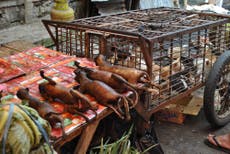Food market ban by WHO overlooks risk from chickens and fish, warn activists
‘As long as live-animal markets remain open, sensitive beings will suffer and humans will be at risk,’ says Peta
Your support helps us to tell the story
From reproductive rights to climate change to Big Tech, The Independent is on the ground when the story is developing. Whether it's investigating the financials of Elon Musk's pro-Trump PAC or producing our latest documentary, 'The A Word', which shines a light on the American women fighting for reproductive rights, we know how important it is to parse out the facts from the messaging.
At such a critical moment in US history, we need reporters on the ground. Your donation allows us to keep sending journalists to speak to both sides of the story.
The Independent is trusted by Americans across the entire political spectrum. And unlike many other quality news outlets, we choose not to lock Americans out of our reporting and analysis with paywalls. We believe quality journalism should be available to everyone, paid for by those who can afford it.
Your support makes all the difference.A groundbreaking call by the World Health Organisation (WHO) for a ban on the sale of live mammals in food markets is only a half-measure and fails to halt risks of disease from ducks, chickens, fish and frogs kept for sale, animal-rights activists are warning.
The WHO has urged all world governments to suspend the trade in “live caught wild animals of mammalian species” slaughtered for food in public street markets or for breeding.
The emergency measure, announced on Monday, is an attempt to prevent future outbreaks of diseases such as the coronavirus.
But the People for the Ethical Treatment of Animals (Peta) organisation says such a ban would still leave the risk of another pandemic emerging, as well as “creating a living hell for animals”.
The advice by the WHO and the World Organisation for Animal Health follows a joint study with health officials in China into the origins of Covid-19, which found that markets where animals were kept in cramped cages were a likely source of the outbreak.
Scientists from a range of backgrounds have been lobbying the WHO since almost the start of the pandemic for a crackdown on such places, because the stress of being confined reduces animals’ immunity, leaving them more susceptible to disease.
Open-air markets also bring into close contact animals that would never normally meet in the wild, again raising risks of viruses jumping species.
The WHO advice states that although it “focuses on the risk of disease emergence in traditional food markets where live animals are sold for food, it is also relevant for other utilisations of wild animals”.
Peta managing director Ingrid Newkirk said: “This is a good start, but does nothing to stop frogs, snakes, chickens and others from being sold, even though confining and killing them in filthy live-animal markets also contributes to the spread of disease.
“As long as live-animal markets remain open and any animal is sold, intelligent and sensitive beings will continue to suffer and humans will be at enormous risk.
“Every live-animal market must close, whether it sells bats in Indonesia or birds in Brooklyn, New York.”
The US-based Wildlife Conservation Society also called for a halt to all commercial trade in wildlife for human consumption in response to the new advice.
The WHO has long stated that animals, particularly wild ones, are the source of more than 70 per cent of all emerging infectious diseases in humans, many of which are caused by novel viruses.
The rate at which new viruses have emerged has risen sharply in the past century, notably since the flu pandemic of 1918.



Join our commenting forum
Join thought-provoking conversations, follow other Independent readers and see their replies
Comments